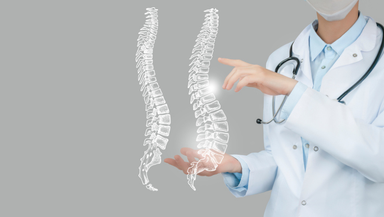The surgery duration continues between four and eight hours based on how challenging the surgical approach becomes. Extended surgical procedures need prolonged duration to achieve optimal outcomes.

- Synopsis
- Introduction
- What is Spinal Reconstruction Surgery?
- Types of Spinal Reconstruction Surgery
- Conditions Treated with Spinal Reconstruction Surgery
- The Procedure: What to Expect
- Benefits of Spinal Reconstruction Surgery
- Why Choose Gleneagles Hospitals for Spinal Reconstruction Surgery in Bangalore?
- Conclusion
Synopsis
Patients with severe spinal difficulties have excruciating pain, structural problems, and diminished mobility, all of which have a detrimental impact on their quality of life. Spinal reconstruction surgery serves as a specific medical operation which fixes spinal abnormalities while providing spinal stability and decreasing ongoing pain.
Introduction
Gleneagles Hospitals delivers advanced spinal reconstruction surgery to patients in Chennai through a medical staff of experts who use modern surgical practices. Our skilled and expertise-possessing spine surgeons collaborate with advanced technology to provide safe yet effective medical treatments to each patient. Here we will explore the types, surgical techniques, recuperation period, and reasons why Gleneagles Hospitals has emerged as a top option for spine reconstructive operations.
What is Spinal Reconstruction Surgery?
A life-altering procedure called spinal reconstruction surgery is performed to fix a spinal misalignment or deformity. Correcting structural deformities of the spine caused by trauma, degenerative illness, or congenital deformity is a difficult procedure. In order to reduce pain and restore your ability to live a normal life, spinal reconstruction is performed to connect the lower and higher vertebrae. The procedure improves mobility, relieves nerve compression, and realigns the spine. Modern tools and a skilled surgeon are required for complex spinal procedures. At Gleneagles Hospitals, you are served by the most experienced spinal experts.
Types of Spinal Reconstruction Surgery
To treat a variety of ailments, Gleneagles Hospital conducts a number of spinal procedures. They are:
- Vertebroplasty: In this procedure, a specialised needle is used to inject medical cement into damaged vertebrae. It strengthens the bone and is most frequently used to treat osteoporosis-related fractures.
- Kyphoplasty: Similar to vertebroplasty, the process includes an additional stage in which a balloon is inflated to provide space prior to the injection of cement, hence improving bone stability.
- Laminectomy: To relieve pressure on the spinal cord, the surgeon removes the lamina, a section of the vertebra, during this procedure. The most common usage for it is to treat spinal stenosis.
- Diskectomy: By removing damaged tissue from a spinal disc, this technique relieves pressure on nerve roots and reduces disc herniation discomfort.
- Spinal Fusion: Through the use of a metal rod or bone graft, two vertebrae are fused together to stabilise the back and reduce discomfort associated with movement.
- Foraminotomy: To reduce pressure and improve nerve function, this procedure widens the gap between squeezed-on nerve roots.
- Nucleoplasty: A minimally invasive procedure where a laser vaporises and removes destroyed disk tissue, easing pressure on nerves and enhancing mobility.
Your health matters – get expert advice today.
Conditions Treated with Spinal Reconstruction Surgery
Patients with a range of spine conditions that impair movement and cause persistent discomfort are recommended to have spinal reconstruction surgery. These consist of:
- Spinal Deformities: Abnormal curvature of the spine due to conditions such as scoliosis, kyphosis, and lordosis, creating discomfort and limited movement.
- Degenerative Disc Disease: Spinal disc deterioration over time, which causes stiffness and compression of the nerves.
- Spinal Fractures: These fractures, which can be caused by trauma, osteoporosis, or accidents, require stabilisation in order to preserve the integrity of the spine.
- Herniated Discs: When spinal discs press on nerves, leading to severe pain, numbness, or weakness in the limbs.
- Spinal Stenosis: Compression of the nerves caused by the spinal canal narrowing, which causes discomfort and makes walking difficult.
- Spinal Tumours: Benign or malignant tumours that compromise the strength of the spine and require surgery.
- Failed Back Surgery Syndrome (FBSS): Cases when prior spinal procedures needed to be corrected because they did not accomplish the desired results.
Choosing Gleneagles Hospitals for spinal reconstruction surgery in Bangalore ensures a customised treatment plan and a specialised assessment for each patient.

The Procedure: What to Expect
A good prognosis requires careful planning, accurate surgery, and thorough post-operative care. A detailed explanation of what to expect is provided below:
Pre-Surgery Preparation
Medical Assessment A comprehensive medical examination will be conducted by your doctor to assess the state of your spine. When determining the extent of the spinal issue and scheduling the treatment appropriately, imaging tests such as MRIs, CT scans, and X-rays are essential.
Lifestyle Modifications Patients are frequently advised to alter their lifestyle prior to surgery in order to promote more efficient recovery. Since smoking damages blood flow and hinders recovery, this may include quitting smoking. Being overweight will increase the strain on the spine; thus, maintaining a healthy weight is also crucial.
Anaesthesia Planning The surgical team will decide between regional anaesthesia, which numbs only the affected area, and general anaesthesia, which keeps you entirely unconscious, based on the difficulty of the procedure and your prior medical history.
During the Surgery
Incisions and Access Your surgeon may do an open procedure or a minimally invasive technique, depending on how serious your disease is. Less scarring, shorter recovery periods, and smaller incisions are all features of minimally invasive surgeries.
Stabilisation Surgeons can use rods, screws, or bone grafts to stabilise and support the spine. These devices promote healing and maintain the spine in its proper alignment.
Closure To reduce scarring and promote the best possible recovery, the surgeon will gently seal the incisions when the procedure is complete.
Post-Surgery Care
Pain Management Following surgery, drugs are used to manage pain and discomfort. Additionally, physical treatment is recommended to improve mobility and strengthen the back muscles.
Rehabilitation Strength, flexibility, and mobility can only be restored with professional-led rehabilitation activities. Based on your progress and intended results, your therapist will modify the program.
Regular Follow-Ups Your healthcare provider will schedule regular check-ups to monitor your recovery. Imaging tests may be repeated to ensure proper spinal alignment and healing.
By following these steps, patients undergoing spine reconstruction can achieve improved mobility, reduced pain, and an overall better quality of life.
Benefits of Spinal Reconstruction Surgery
Spinal reconstruction surgery in Bangalore at Gleneagles Hospitals has numerous advantages that are likely to enhance the quality of life.
- Pain Relief: Chronic back pain caused by conditions like spinal deformity or nerve compression is effectively eliminated by spinal reconstruction surgery. By relieving pressure on the nerves, spinal stabilisation helps patients experience significant pain relief, allowing them to carry out daily tasks in a comfortable manner.
- Improved Mobility: Spinal disorders can limit movement. By re-establishing the appropriate alignment of the spine, surgery improves mobility and flexibility. Following surgery, patients may find that walking, bending, and other motions are easier.
- Correction of Spinal Deformities: By correcting anomalies like kyphosis and scoliosis, spinal restoration also improves body mechanics, posture, and balance.
- Minimally Invasive Techniques: Reduced incisions, shorter recovery times, less scarring, and less postoperative discomfort are all benefits of the newest technology.
- Long-Term Stability: Additionally, the process strengthens the spine, preventing further issues like herniated discs or recurrent deformities.
A healthy spine might result from receiving expert care at Gleneagles Hospitals for those with spinal abnormalities or persistent back pain.
Why Choose Gleneagles Hospitals for Spinal Reconstruction Surgery in Bangalore?
Gleneagles Hospital is a major centre for spinal reconstruction surgery in Bangalore that offers advanced surgical treatment and exceptional patient care. In the following sections, we attempt to elaborate why patients choose us:
- Expert Spine Surgeons: Our team of specialists possesses extensive training and experience in complex spine surgery reconstruction procedures.
- Advanced Technology: We perform spine surgeries in our hospital using robotic systems and minimally invasive techniques that are time-effective and tend to entail less pain as well as an enhanced quality of recovery post-treatment for the patient.
- Personalised Treatment Plans: Medical professionals treat using techniques unique to each individual patient and consider the history of each patient's medical record along with their current state of health.
- Comprehensive Rehabilitation: Patients undergo post-operative physical therapy alongside pain management and mobility exercises to achieve full recovery.
- State-of-the-Art Facilities: Our hospital utilises cutting-edge surgical and diagnostic technology to deliver optimal patient care.
- Minimally Invasive Options: To reduce recovery time and postoperative discomfort, we employ minimally invasive spinal surgery wherever feasible
- Multidisciplinary Care Team: To provide comprehensive care for spinal problems, our specialists collaborate across the departments of neurology, orthopaedics, and rehabilitation.
- High Success Rates: We have a strong history of treating challenging spinal conditions with outstanding results for our patients.
Conclusion
Spinal reconstruction surgery in Bangalore functions as an advanced medical technique which both maintains spinal stability and improves patient life quality. Gleneagles Hospitals in Chennai serves patients with the highest level of spinal reconstruction surgery together with state-of-the-art medical treatments and steadfast support during recovery. The decision to undergo spine surgery necessitates a consultation with our specialists, who will help you investigate the optimal treatment options for your condition.
Our Doctors
View allDr Naveen M A
HOD & Sr Consultant - Minimal Access Brain and Spine Surgery
MBBS, MS, MCh (Neuro), FMAS, FMISS (Seoul), FASS (USA), Fellow Skull base Endoscopy (USA)
Frequently Asked Questions
Patients face low risks when skilled surgeons execute spinal reconstruction procedures. The surgical risks decrease when doctors carefully plan procedures followed by proper postoperative care measures.
The majority of surgical patients regain full mobility in their usual activities during a timespan between 3 to 6 months. The duration of recovery differs between individuals, so getting medical recommendations provides the best possible results.
Once their spinal rehabilitation process is complete, most individuals regain their ability to participate in physical activities. Strength and mobility are improved as a result of rehabilitation procedures.
Gleneagles Hospitals offers expert care, advanced technology, and personalised treatment, ensuring the best possible results.
















